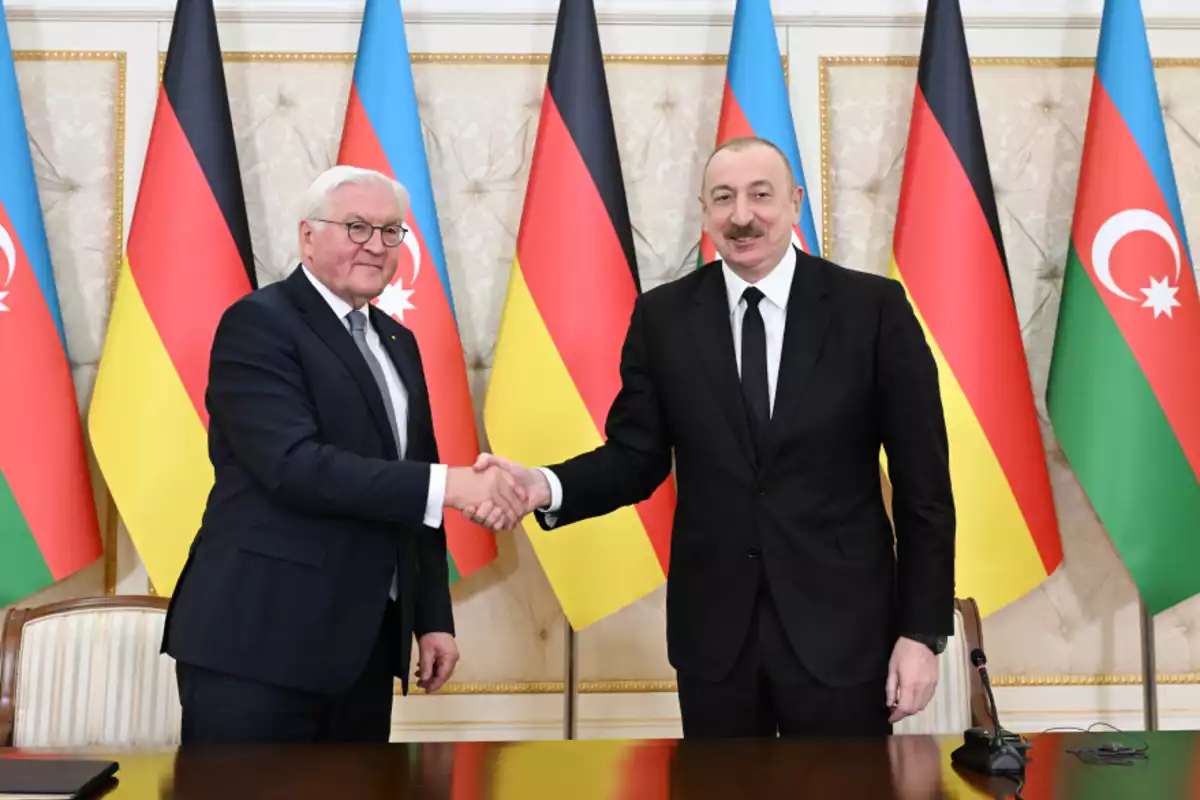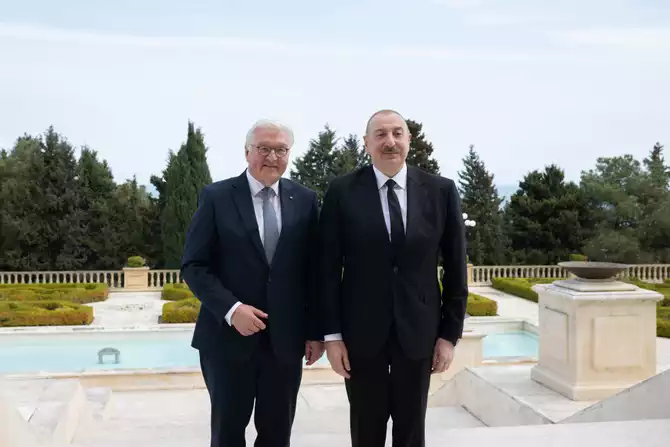
Photo credit: Azertac
By Tural Heybatov
A controversy that erupted on the eve of the German President’s visit to Azerbaijan somewhat clouded the diplomatic atmosphere.
How the flag of the defunct separatist regime ended up on Frank-Walter Steinmeier’s social media page remains a mystery. Questions also remain regarding the longer duration of the German President’s visit to Armenia compared to Azerbaijan, along with several other issues. These matters were likely raised in Baku, albeit behind closed doors.
The Office of the Federal President of Germany issued an apology for the provocations, attributing them to a technical error. This explanation is sufficient to consider the incident resolved.
What truly matters is that, while in Baku, President Steinmeier made an unequivocal statement affirming that Karabakh is Azerbaijan-a clear and direct position of official Berlin. “We have always said that this is your [Azerbaijani] territory, and today we reaffirm Germany’s clear and direct stance,” the German President declared.
This was the first official visit by a German President to Azerbaijan. During his stay, Steinmeier was in high spirits-and there is no reason to doubt the sincerity of this positivity. The reality is that relations between our two countries are genuinely strong and mutually beneficial. It is highly unlikely that Berlin would jeopardize these relations for short-term political considerations, such as siding with Armenia at the expense of its partnership with Baku.
In fact, trade between the two countries nearly tripled in the first two months of this year compared to the same period last year. Tripled! Germany now ranks fifth among Azerbaijan’s largest economic partners.
Germany has shown increasing interest in Azerbaijan’s energy sector. In January-February 2025, Azerbaijan exported 500,000 tons of oil and oil products to Germany, valued at $276.5 million. This is 5.3 times and 6.1 times more, respectively, than in the same period in 2024. Germany now ranks as the second-largest buyer of Azerbaijani oil and is expected to expand its purchases of Azerbaijani gas in the near future. During his meeting with journalists in Baku, the German guest recalled that in 2022, when Russian gas supplies were disrupted, Azerbaijan committed to providing Germany with the necessary volumes.

Photo credit: Azertac
Germany is also interested in transport cooperation with Azerbaijan as a gateway to Central Asia and China. During his visit, President Steinmeier stressed that the Middle Corridor is a vital project for the German economy.
Thus, the provocation-whose origins remain unclear-cannot outweigh the immense opportunities that Azerbaijan-Germany cooperation holds for both countries. This is a reality that, one would hope, is well understood in Germany.
During the meeting in Baku, the high-ranking guest and his Azerbaijani counterpart, President Ilham Aliyev, devoted considerable attention to the establishment of peace in the South Caucasus. Germany, like several other countries, seeks to play the role of mediator and peacebuilder, relying on its good relations with both sides. While in Baku, Steinmeier spoke optimistically about the prospects for peace, the finalization of the peace treaty text, and the fulfillment of conditions necessary for its signing.
However, President Aliyev had to clarify to the visiting leader that such optimism was premature when it came to the implementation of all conditions. The text of the treaty has been finalized, and Azerbaijan has not put forward any preconditions. However, two key requirements remain that Armenia must fulfill.
“First, the OSCE Minsk Group must be dissolved. The second issue concerns the Armenian Constitution. Armenia’s Constitution contains a reference to the Declaration of Independence, which is an integral part of it. That document includes a clause on the unification of Azerbaijan’s legal and historical territories with Armenia-an open territorial claim against us. Therefore, the removal of this provision from the Armenian Constitution is our legitimate demand. Once these two conditions are met, there will be no obstacles to signing the peace treaty. As the saying goes, the ball is in Armenia’s court. If Armenia truly wants peace, it must accept these two legitimate conditions set by Azerbaijan,” the head of state emphasized.
President Ilham Aliyev noted that Azerbaijan’s historic victory had opened the path to peace talks. In his view, Azerbaijan and Armenia have now moved significantly closer to achieving peace. It was Azerbaijan-not the defeated Armenia, nor the co-chairs of the now-defunct Minsk Group-that initiated the peace talks. This initiative belongs to the victorious country. Azerbaijan is interested in the signing of a peace agreement.
“There is no such entity as the so-called 'Nagorno-Karabakh Republic,' which Armenia insisted on including in the peace treaty until January 2024. It existed only in Armenia’s imagination. In Azerbaijan, there is the Karabakh region,” President Aliyev stated. This was a factual affirmation of the new reality, and to some extent, a reminder to the German side to avoid any future “technical errors.
” As for Azerbaijani-German relations, as noted earlier, they are actively developing. In particular, there are ongoing discussions in the field of renewable energy, an area in which Germany has significant expertise. The two countries have much to discuss and work on. The key now is to ensure that no external forces are allowed to cast a shadow over these growing relations.
Share on social media